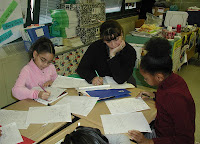Summer's Potential for Writing…

It’s the end of another Australian school year, so I am aware of the level of exhaustion that abounds in schools, and the need to tie up a multitude of loose ends prior to school closing for the summer holidays. Teaching becomes a race to the finish line. The last week of school seems to take the longest time of all the many school weeks. I am also aware that on summer’s horizon teachers will have some free time to relax and regenerate their energy reserves.- A time for relaxation, holidays, family and recreation. For those of you who have intentions of adopting a new approach to aspects of your teaching in 2013, may I suggest that the summer holidays might present a great opportunity to embrace the inner writer and embrace your very own writer’s notebook. I know many of you read extensively when you are on vacation. Free of the pressure of the classroom, it is possible to indulge in more personal reading; becoming re-acquainted with favorite authors, or to read that book ...






